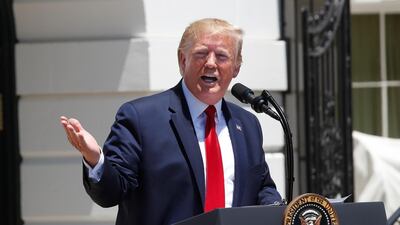US President Donald Trump on Monday defended his tweet calling on four Democratic congresswomen of colour to go back to their “broken and crime-infested” countries.
Broad condemnation of his comments “doesn’t concern me because many people agree with me”, he said.
Mr Trump responded to questions at the White House after his Sunday tweet assailing the members of Congress, all of whom are US citizens and three of whom were born there.
He has been roundly criticised by Democrats who called his remarks racist and divisive.
Some Republicans have also objected, although most leading members of the party have stayed silent.
Mr Trump said on Monday that if the legislators “hate our country”, they can leave.
“If you’re not happy in the US, if you’re complaining all the time, you can leave, you can leave right now,” he said.
It was yet another sign that Mr Trump, who won the presidency in 2016 in part by rallying disaffected voters with racial speech, will continue that strategy for the 2020 election.
He has faced few consequences for such attacks.
Earlier on Monday, Mr Trump made it clear he had no intention of backing down.
He asked on Twitter when “the radical left congresswomen” would “apologise to our country, the people of Israel and even to the office of the president, for the foul language they have used and the terrible things they have said”.
“So many people are angry at them and their horrible and disgusting actions,” he wrote.
Asked whether Mr Trump’s comments were racist, Marc Short, chief of staff to Vice President Mike Pence, defended the president.
He said Mr Trump had been responding to “very specific” comments made by Ilhan Omar of Minnesota, who was born in Somalia, and was not making a universal statement.
But Mr Trump did not make that distinction in his tweets.
He was referring to a group of women representatives who call themselves “the squad” – Ms Omar, Alexandria Ocasio-Cortez of New York, Ayanna Pressley of Massachusetts and Rashida Tlaib of Michigan.
“I don’t think that the president’s intent any way is racist,” said Mr Short, giving as an example Mr Trump’s choice of Elaine Chao, who was born outside the country, as his Transport Secretary.
Ms Chao is one of the few minorities working among the largely white and male aides in prominent roles in Mr Trump’s administration.
She is the wife of Senate Republican leader Mitch McConnell, who had made no comment on Mr Trump’s attacks on Monday.
Republicans also remained largely silent after Mr Trump’s Sunday morning insults that caused Democrats to set aside their internal differences and rise in a chorus against him.
House Speaker Nancy Pelosi said Mr Trump wants to “make America white again”, while Ms Ocasio-Cortez said Mr Trump “can’t conceive of an America that includes us”.
“Mr President, the country I ‘come from’ and the country we all swear to is the United States,” she tweeted. “You rely on a frightened America for your plunder.”
Ms Omar tweeted: “You are stoking white nationalism because you are angry that people like us are serving in Congress and fighting against your hate-filled agenda.”
Ms Pelosi announced on Monday that the House would vote on a resolution condemning Mr Trump’s comments.
Meanwhile, Republican Senator Lindsey Graham, a close ally of the president who played golf with him over the weekend, advised him to "aim higher" during an appearance on Fox and Friends.
But Mr Graham accused the four members of being anti-Semitic and anti-American.
“Don’t get personal. Don’t take the bait,” Mr Graham said.
He said the four were American citizens who were duly elected, but: “We all know AOC [Ms Ocasio-Cortez] and this crowd are a bunch of communists. They hate Israel. They hate our own country.”
Mr Trump earlier interfered in a rift between Ms Pelosi and Ms Ocasio-Cortez, only two days after he offered an unsolicited defence of the Democratic Speaker.
Ms Pelosi has been trying to minimise Ms Ocasio-Cortez’s influence in the House Democratic caucus in recent days, prompting her to accuse the Speaker of trying to marginalise women of colour.
Mr Trump’s words may have been meant to widen the divide among Democrats, who have been at odds over how far to go in countering him and whether to proceed with impeachment proceedings against him.
Instead, the president’s tweets brought the Democrats together.
Former vice president Joe Biden, the Democratic presidential front runner, on Sunday said on Twitter that Mr Trump “continues to spew hateful rhetoric, sow division and stoke racial tensions for his own political gain”.
Senator Elizabeth Warren, another Democratic presidential candidate, tweeted: “Let’s be clear about what this vile comment is: a racist and xenophobic attack on Democratic congresswomen”.
It was far from the first time that Mr Trump has been accused of holding racist views.
At his campaign launch in June 2015, he called many Mexican immigrants rapists.
In 2017, he said there were good people on “both sides” of the clash in Charlottesville, Virginia, between white supremacists and anti-racist demonstrators, one of whom was murdered.
Last year, during a private White House meeting on immigration, Mr Trump wondered why the US was admitting so many immigrants from countries such as African nations.
Repeatedly, he has described arriving immigrants as an “infestation” and has been slow in condemning acts of violence by white supremacists.
And Mr Trump launched his political career with false claims that former president Barack Obama was not born in the US.
Fearful of his Twitter account and sweeping popularity among many Republican voters, his party’s legislators have mainly tried to ignore the provocative statements.

